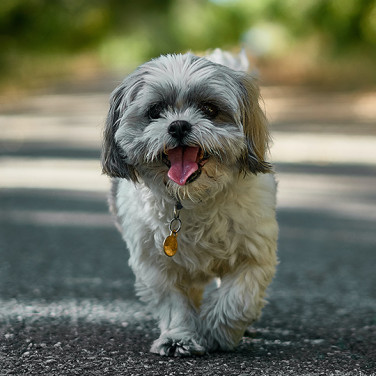DISEASES
Kennel Cough - Causes, Symptoms, Prevention, and Treatments
페이지 정보
본문


What is Kennel Cough?
Canine infectious tracheobronchitis, which is the official veterinary term for kennel cough, is a highly contagious respiratory condition. It is called kennel cough because infections often occur in kennels where puppies are raised together, such as in shelters. Infections are caused by both viruses and bacteria that spread from puppy to puppy through secretions like coughing or a runny nose. Mild symptoms may resolve on their own, but hospital treatment may be necessary for more severe infections. The disease can be prevented through vaccination, or in the case of a dog with a weak or compromised immune system, it is recommended to avoid crowded places.
What are the common causes of kennel cough in dogs?
Viral and bacterial infections
Kennel cough is also sometimes referred to as Canine infectious respiratory disease complex (CIRDC) because it is a condition that can be caused by multiple viruses or bacteria.
The main viruses and bacteria that cause kennel cough are:
- Parainfluenza virus - Canine parainfluenza virus (CPIV)
- Adenovirus - Canine adenovirus type 2 (CAV-2)
- Distemper virus - Canine distemper virus (CDV)
-
Bordetella bronchiseptica (bacteria)
The Bordetella bronchiseptica bacterium is the main cause of infection, and infections occur when combined with other viruses.
Respiratory infections
The respiratory system protects itself from external factors such as viruses through mucus. However, under certain circumstances, protection may be weakened, leaving your dog more susceptible to infection, such as:
- Living in a congested space
- Stressful situations
- Exposure to cigarette smoke or dust
- Cold temperature
Transmission from an infected dog
Like the common cold, kennel cough can be spread to other dogs through airborne or contact with contaminated materials. It can be transmitted if your dog frequents a space where many dogs are gathered or share water and food bowls.
Symptoms of kennel cough
Exposure to kennel cough usually results in respiratory symptoms 2 to 3 days after contact, but in some cases, it can take as long as 10 days. Symptoms may last for several weeks.
Here are some of the most common symptoms of kennel cough:
-
A persistent, loud, and strong cough
It is the most common symptom and appears early and may sound like a goose honking.
-
Runny nose, tears
-
Sneezing
-
Lethargy, loss of appetite, or a high fever
If your dog has come into contact with kennel cough and exhibits these symptoms, a visit to the hospital is necessary.
When to see the vet for kennel cough
Kennel cough usually appears within 2 to 14 days after exposure and can last for 1 to 2 weeks. It is important to be cautious after the infection goes away, as it can be contagious to other dogs for up to 2 to 3 months. Puppies under 6 months of age, older dogs, and immunocompromised dogs with underlying medical conditions are at risk of developing serious symptoms.
Prolonged respiratory symptoms from kennel cough can lead to pneumonia. Respiratory symptoms can also be caused by a canine influenza virus and other severe diseases such as tracheal collapse, bronchitis, asthma, and heart disease. It is very rare for humans to get kennel cough, but it can be transmitted to cancer patients and severely ill patients with severely weakened immunity, so caution is necessary. To prevent the transmission of kennel cough, proper disinfection of the infected dog's environment and toys is necessary. If you have other dogs living with you, it is important to isolate them.
How to manage kennel cough at home

Mild cases of kennel cough may resolve itself with rest in a clean and well-ventilated environment. To help alleviate symptoms such as a runny nose or tears, first keep the areas clean with a warm, damp towel and place a humidifier in your pet’s environment. When going out, it is recommended to use a harness instead of a leash to minimize any interference with your dog’s airway.
How is kennel cough diagnosed at the hospital?
Since various diseases can cause respiratory symptoms, it is necessary to differentiate them for accurate treatment.
If you come to the hospital with respiratory symptoms, your veterinarian may ask the following to determine which tests to conduct:
- When did the cough start?
- What is the frequency of coughing?
- What does the cough sound like?
- Are there any other respiratory symptoms (runny nose, sneezing)?
- Has your dog had a fever recently?
- Have you recently been to a place with lots of dogs?
- Which vaccinations have your pet had and when were they last vaccinated/boosted?
To rule out the possibility of other diseases, the following tests may be performed:
-
Physical examination
Feeling the trachea and listening to the sound of the trachea and lungs through auscultation.
-
Thoracic X-ray
Checking the heart, organs, and lungs can rule out tracheal collapse, heart disease, and tumors.
-
PCR test
A PCR test can then be performed to confirm the infectious agent. Typically, a veterinarian will make a provisional diagnosis of kennel cough based on history, physical examination, and chest radiograph. PCR tests can be performed to detect bacteria and viruses for a more certain diagnosis and to know the type of infectious agent. (bacterial, viral DNA, or RNA)
How is kennel cough treated at the hospital?
If the symptoms of kennel cough are mild, they often resolve on their own with ample rest for up to 1 to 2 weeks. Since there is no direct treatment method for the virus, treatment plans are catered to the symptoms present.
Depending on your dog's condition, you may receive the following treatments:
- Antibiotic use against the Bordetella bacteria
- Cough suppressants and anti-inflammatory drugs can be used to mitigate certain symptoms.
- A nebulizer can be used to moisten the respiratory tract. Sometimes antibiotics or bronchodilators are breathed directly into the respiratory tract through a nebulizer as well.
Prognosis
In the case of kennel cough, recovery takes 1 to 3 weeks if appropriate treatment is carried out.
How to prevent kennel cough in your dog
A vaccine against the Bordetella bacteria, which is the main cause of kennel cough, is available in oral, nasal, and injection forms. When injected orally or nasally, local immunity is formed in the mucous membrane. It is typically given in two doses, spaced 2 to 4 weeks apart, followed by a booster vaccine once every 6 months to 1 year. However, it is important to note that while most cases of kennel cough are caused by Bordetella, other infections can also cause kennel cough. Therefore, the Bordetella vaccine does not guarantee full immunity from kennel cough.
Some of the other agents that cause kennel cough have vaccines as well:
- Comprehensive vaccine: Distemper virus, Adenovirus 2, Parainfluenza
- Influenza Vaccine: Canine influenza
-
Bordetella vaccine: Bordetella bronchiseptica
Among them, only comprehensive vaccines are considered core vaccines, and influenza and bordetella vaccines are optional (non-core) vaccines. In general, if you go to a veterinary hospital, you can request to receive both core and non-core vaccines.
Find out more about your dog’s disease or symptoms in the Buddydoc Library!

The Buddydoc library is filled with everything you’d want to know about each symptom and disease your pet may experience. If you would like to find out more about the causes, signs, treatments, preventions, and more for your dog’s disease. Try out the Buddydoc app and search your pet’s symptom or disease in the Buddydoc library.












